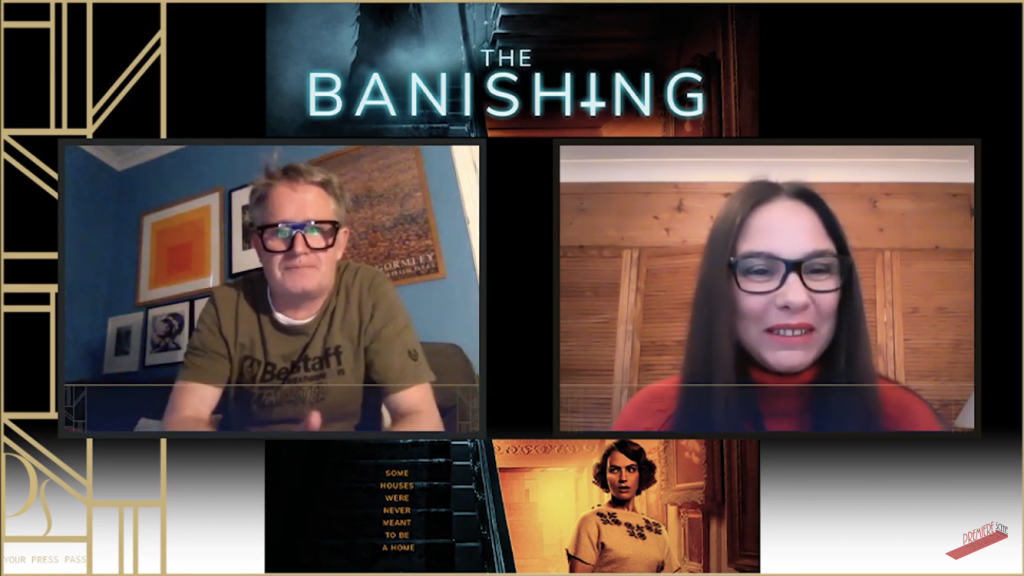
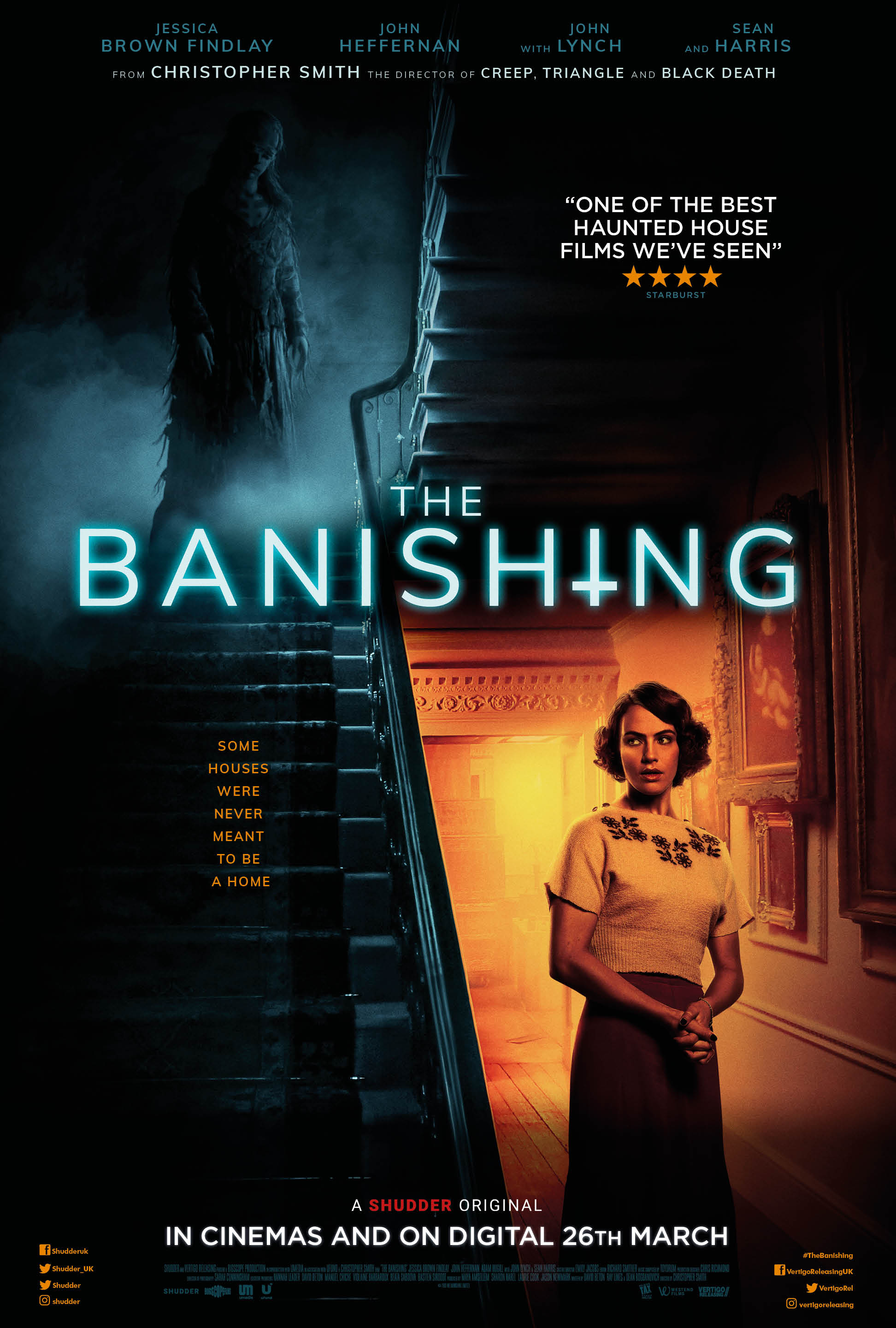
At A Glance
Starring Jessica Brown Findlay (Downton Abbey) The Banishing is a suspenseful horror set in the 1930s inspired by the reputedly most haunted house in England, Borley Rectory. The eve of World War II casts an onerous shadow as a reverend, his wife and young daughter arrive at the house, but it will take more than their faith to face the malevolence surrounding them.

Film Details
Directed by Christopher Smith
Written by David Beton, Ray Bogdanovich, Dean Lines
Released by Shudder & Vertigo
2021, 97 minutes
Available to download 26th March 2021
Social Media: @Shudder_UK, @VertigoRel #TheBanishing
Cast
Jessica Brown Findlay as Marianne
John Lynch as Malachi
Sean Harris as Harry Price
John Heffernan as Linus
Adam Hugill as Frank
Director Chris Smith tells us why the ulitimate horror is the perfect balance of social commentary and a really great night out at the movies
By Claire Bueno
Having worked predominately in TV director Chris Smith has also made quite a name for himself in film. Having directed features including Black Death, Detour and Severance he has worked with some of the finest acting talents such as Eddie Redmayne, Sean Bean and Tye Sheridan. The Banishing is no different as Jessica Brown Findlay, John Lynch and Sean Harris all deliver uniquely nuanced performances anchoring us into the story. I was lucky enough to interview Chris to find out more about this haunted house tale with the character driven plot.
What I found once I finished watching it and that it was based on a real life haunted house, I just wanted to go and find out all about it, and I wondered whether when you read the script it had the same reaction on you? Or did you know about it already?
No I didn’t, you see I joined, I come at it slightly differently (laughs) because I kind of read it, liked the script and then discovered that it was real. I was like “what do you mean real? It’s not real. It can’t be real (laughs)” I’m sort of like. “So it really happened? They’re real characters? You mean they are real characters?” But I’m not gonna get into is i t real or is not real, did certain characters come into the house and get affected by that house. To me it all hauntings, all ghost stories are about what’s in the character, who is in the house. As soon as I felt that I was like, ok I need to know, I want to push this so, very much is it in her head? Is it her? Is it the relationship she’s in? She’s in this nutcase relationship which in the 1930s even being married to a women with a child would have been a scandal. And some of these things I didn’t think were pushed enough in the script, so let’s get away from trying to replicate for real, let’s use the characters and push it slightly more at some tangents. You kno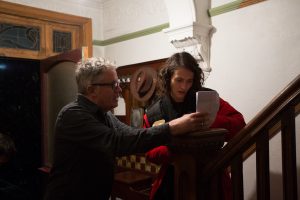 w use the version of Harry, and keep the Harry character, but make him this garish kind of modern, is he straight? Is he gay? Is he an atheist? Is he toying with taunting the priest? And he asks the questions we all want to ask. You know, why are you with this man (laughs)? And he’s very direct so, we sort of pushed it that way and the reason is as I say, I thought that all ghost stories are, they are about you and what your fears are. If you went into a house alone in a spooky place your mind would make you more scared than you need to be (laughs). And so with mine, if you went there with a group of friends or a party and you were sharing a room, you wouldn’t even give that a thought. So it is all within us and I think it is, yeah I like to lean into that and so and I think that is why Jess (Jessica Brown Findlay) has done such a great job in terms of, you know she really captures the predicament she’s in, if you like, and by that I don’t just mean the house, I mean the predicament of a marriage that she has taken for convenience with her daughter. And so it’s all those things I find interesting in the film.
w use the version of Harry, and keep the Harry character, but make him this garish kind of modern, is he straight? Is he gay? Is he an atheist? Is he toying with taunting the priest? And he asks the questions we all want to ask. You know, why are you with this man (laughs)? And he’s very direct so, we sort of pushed it that way and the reason is as I say, I thought that all ghost stories are, they are about you and what your fears are. If you went into a house alone in a spooky place your mind would make you more scared than you need to be (laughs). And so with mine, if you went there with a group of friends or a party and you were sharing a room, you wouldn’t even give that a thought. So it is all within us and I think it is, yeah I like to lean into that and so and I think that is why Jess (Jessica Brown Findlay) has done such a great job in terms of, you know she really captures the predicament she’s in, if you like, and by that I don’t just mean the house, I mean the predicament of a marriage that she has taken for convenience with her daughter. And so it’s all those things I find interesting in the film.
Yeah absolutely and I think that, kind of sense of isolation that she has in her marriage is mirrored in the sense of isolation she’s got in this house. The lack of trust that her husband has in her affects whether she is of sound mind and body and adds to the complexity.
Not trusting her past, he’s too scared to sleep with her, you know (laughs) and it sort of ferments in the house, and the house represents, you know ‘the house’ ferments their breakdown if you like. And it’s these slightly grubby things, and I say grubby because you look at these kind of very clipped 1940s films of the period. You know we’ve all grown up with ‘the Spitfire’, ‘the success of World War II’, it all feeds into the sort of Brexit myth of ‘the good old version of England’ which was this version when fascism was on the rise, gay guys hung themselves, marriages, you know, people were in these stifling marriages, so I was trying to just lean into which version of old England do you think was brilliant (laughs). I tried to touch into that a little bit. Because the good old days are today.
Yeah it’s true because that’s what makes this film so much more interesting because there are so many other conflicts and complexities set 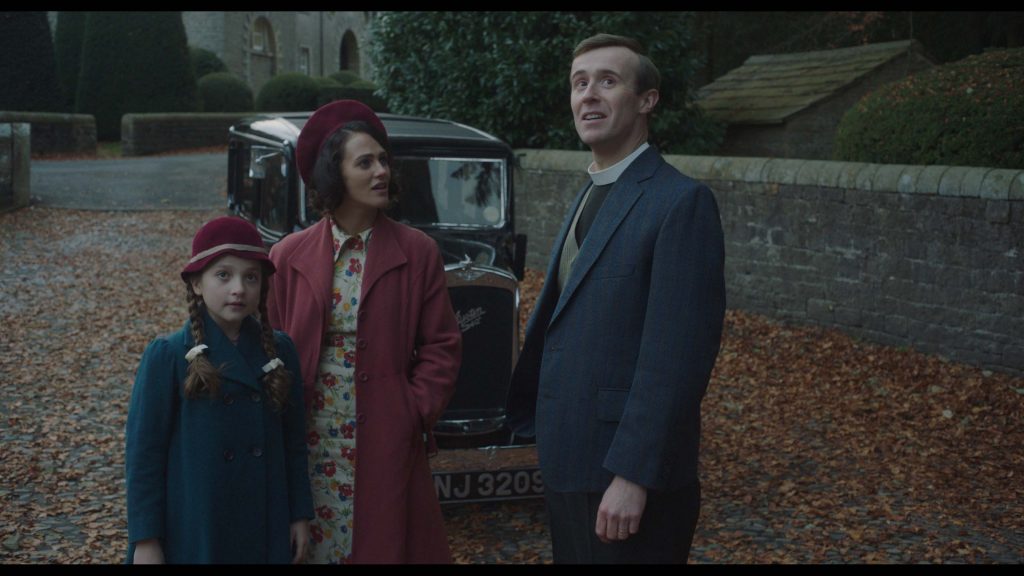 around what is this haunted house story.
around what is this haunted house story.
We lean into it a bit, yes.
Because we are on the eve of World War II, so this adds this other kind of whole layer of this onerousness that’s hovering over the country that again adds to the tension?
Yeah and the idea of prejudice, and judgemental, and anger, these are all things that we are seeing today, we are seeing angry white people getting angry because ‘what about me? Why was I left behind? This isn’t right’. And that’s fascism, and that’s what happened in that period. I mean I grew up thinking, oh it could never happen here it’s a German thing. Now we go no it’s not, (laughs) it’s not a German thing, it is happening in America you know, we are seeing it play out on the news. It’s really scary and I think just sort of, to touch into that just makes you, open up sores if you like, that’s what I’m trying to do in the film, so you realise, yeah there’s some scares in here, but actually the relationship feels more destructive in a way and then you see this woman from the past was in this real abuse you know with these monks and you go, well there’s abuse going on here and there’s much, much worse abuse going on there. Yeah, I like films that do that and that’s what we are trying to do really. It’s just to make you do errrr, there’s some grubby bits behind the curtains if you like.
“To me it all hauntings, all ghost stories are about what’s in the character, who is in the house."
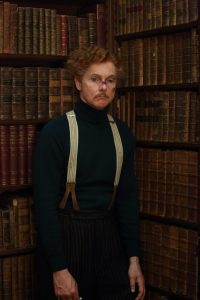
Exactly, and of course to play all of this out convincingly you really have got to have a strong cast that are able to provide you a nuanced performance and you’ve nailed it with all the cast, you must have been so blessed?
Yeah, it was a film, and I really liked the script and what there was and what I felt I could lean into, and I had worked with Sean (Harris) before in Creep in my first film, he played the monster and he’s gone on, he’s just got off the back of doing two back to back Mission Impossible movies (laughs), so he’s come from the biggest films you can to suddenly sharing a house with us up in the North for this. And then Jess who I had worked with before about eight years ago and stayed in touch with, became friends with and you know she’s just so brilliant in it. And she’s got that, we are both quite emotional people me and Jess in the sense that we will tell you what we are feeling. And so she really feels that kind of, she really likes the idea of, here’s a woman who’s made a decision for her child and because society at that time says she has to, who has a past, who has suffered mental illness, who can’t discuss that with anybody. You know what I like in a way is that it is a filthy secret, it’s a filthy secret that only men can talk about that she was in a sanatorium, and it’s all this kind of stuff that I find interesting and how terrible it is. That’s why I dig the good old days of today (laughs).
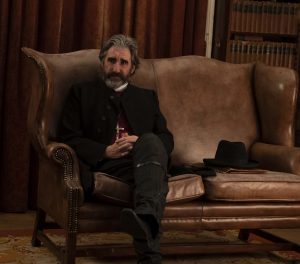
Exactly, and you’ve got somebody like John Lynch as well, he’s like this puppeteer isn’t he? He’s just incredible in the film.
You should meet John he’s lovely, it’s my fourth film with John, l love John. John’s like for me, he’s like a mate and he’s, because obviously John was around because he did Cal way, way back and suddenly he found himself being mates with Larry Mulan from U2 and he’s just like, he knows I grew up loving U2, so ‘Oh Chris’ you know he’s got this beautiful Irish accent. But yeah he’s like a puppet master in it and he’s Machiavellian and he’s play the guy, you know, he’s put him there because he knows the two of them may bring out this evil that’s there and yeah. And when he goes to see what’s a name (Harry), and the fella goes “Sieg Heil” (laughs) you know, he can see he’s a fascist.
And also a huge character in the film and I would imagine equally as important casting is the house that you’re going to be using. Can you tell us a little bit more about going on your location hunts for that?
Well no it was all weird thing, it all happened slightly in reverse so. What happened was we, we know we only had so much money to make the film and so we knew we had to be really cleaver to make the film for that money. Coming off the back of doing being big TV shows where you have unlimited equipment, I suddenly was going back to a level of budget that was lower than what I did for my first film and it was good to have that because you go right we can do what we want effectively but we got very little money. So Jason (Newmark, producer) found this house through a contact of his, it’s a stately home and we used a small corner of it even though it’s big. So all of rooms you see are certain rooms that are inside this home and in the epilogue section when you see the Nazi flags hanging up on the what is supposed to be some Bavarian place, that’s actually the size of the whole house. What we used was the servant’s quarters as the entrance and then we walked around the 30 bedrooms and chose the bedrooms we liked and used them. So we kind of designed it through the space to save the budget and I think it’s clever how it turned out. So the kitchen’s the same, the bedrooms are all there we just chose (laughs) the spookiest ones and there was all this art all over the walls, we had to take all that down so it was kind of a reverse production design in a way.
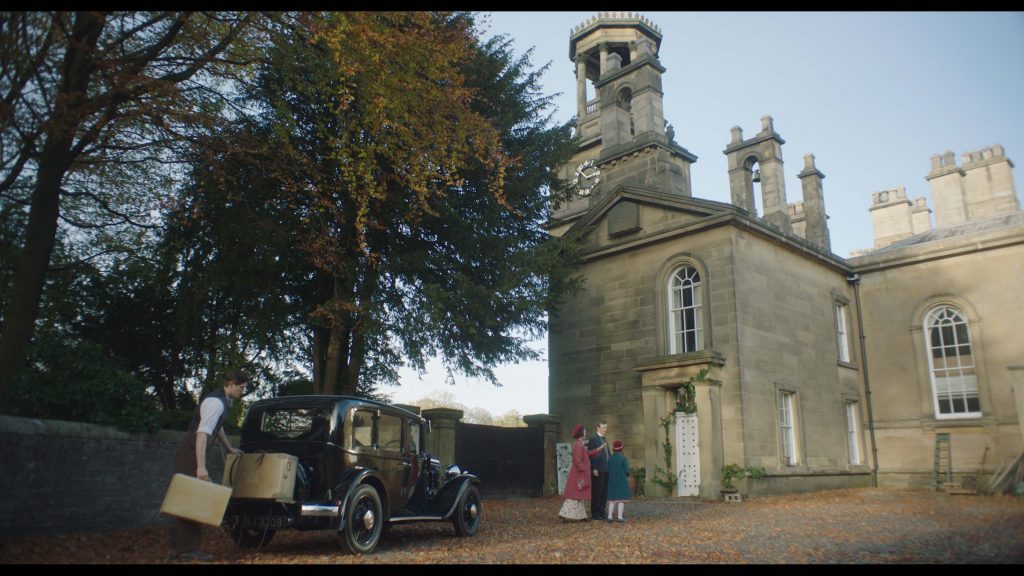
Because you said you are used to working with big budgets where money isn’t an option, when you’ve got to tame that down and you are working with a limited budget to do you think that gives you the opportunity to force your creativity because you problem solve with what you’ve got, you can’t just throw money at it?
Well that’s exactly right it’s like the hardest thing with filmmaking is time and money, it’s like if you’ve got loads of money you can just, you know, there’s always a limit in but this was below the limit in a sense that you couldn’t box your way through it by getting a second unit director or anything like that. But what we found and what’s been happening in the last three years, mostly from doing these TV series in between and obviously because TV has taken off so much is because in TV you don’t wanna, you wanna direct it the way you wanna direct it. If you give a shot of every single character you end up with, you make it in the edit and so naturally I’ve been doing it by being more specific with shots and you know if you look at the start of The Godfather you got the camera slowly pushes in on Marlon Brando and at the very end it cuts to a single of Robert Duvall who opens the door and let’s someone out, there’s no other shots, you know there’s five or six characters in that but they are all positioned in the right place. So what we stared to do was be very specific with where we put the camera, where we shot and you have to plan it much more, so in that regard it was quite disciplined, it had to be.
And I wanted to ask you as well why do you think horror as a genre works so well as a tool for social commentary, horror seems the perfect platform to bring things out in the open that you wouldn’t normally talk about?
Yeah, it’s interesting because it’s always done it but it’s always been a B-movie platform and when I started it was still, in the early 2000s it was, there was a lot of stuff getting made, a lot of torture pawn, it was all called then. But if you look, but in the 10 years when you start looking back at the period and you look at the 70s movies, the slasher movies of the 70s, they are all informed by the Vietnam war, I think when you look at the movies of the early 00s it’s Abu Ghraib there’s all that stuff that we were seeing in the news, so there’s social commentary anyway, but I think in the last 10 years or 15 years since I have started making films it’s become even more intellectual. Horror movies now have allowed you to do all the things you want to do, but the scale of them and when they break through like The Witch or Get Out, films that can really be about something and I think Get Out, I could happily smile and retire if I had made that film because it’s the perfect balance of social commentary and a really great night out at the movies. You know he manages to do both things so perfectly in that film. And I think just to expand on the actors what I love about the genre is that it allows you, and certainly as you see in this to really go into, I’m pretty glad when you mentioned John Lynch’s role, just to go into these, interrogate things and as long as you give some scares and as long as the film still makes you, entertains you in the end, you can say some stuff. And it’s good because everybody gets what they need (laughs). You got to make sure that you give them enough of the jumps and a scare as well, but it’s good, you can slip it under the rug.
The Banishing - Official Trailer
Claire Bueno
Claire Bueno is a film journalist, presenter and interviewer, having moderated BAFTA, Royal Television Society (RTS), Women in Film and Television (WFTV), and Apple Store Q&As and hosted Comic Con panel talks. Claire is the founder of Premiere Scene Magazine and has had the privilege of interviewing esteemed artists including Tom Cruise, George Clooney, Brad Pitt, Sir Anthony Hopkins, Sigourney Weaver, Emily Blunt, Samuel L Jackson, James Cameron and Andy Serkis.
As a media coach Claire works with leading personal publicists, HBO, Netflix, Sky, ITV, Penguin Random House, the BFI, DDA, MacMillan and Premier, offering practical coaching sessions and safe environment for talent to perfect their interview technique before facing the press. She has extensive experience working with emerging and seasoned professionals and where English is not their first language.
Additionally, Claire is the producer of the critically acclaimed feature documentary CLEANIN’ UP THE TOWN: Remembering Ghostbusters and the upcoming TOO HOT TO HANDLE: Remembering Ghostbusters II.